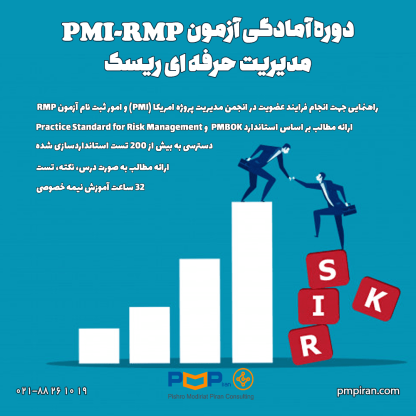
Risk Management Professional Course and RMP Exam Preparation
|
32 hours
Duration
|
12 participants
Course capacity
|
|
8 sessions
During the course
|
4 hours
Per week
|
The course’s importance
Today, the issue of project management in developing countries is critical. As a result of the uncertain nature of projects and the need to make the best use of resources, each project faces uncertainty. As a result, project risk management has become increasingly important and necessary.
The presence of risks and uncertainties in a project reduces its ability to estimate objectives correctly and reduces its efficiency. Due to the well-established position of project management science in projects, the importance of risk management is becoming increasingly apparent.
In projects, risk management uses the techniques and methods from the PMBOK standard to anticipate and prevent future problems and provide solutions when they arise. Hence, we can reduce their destructive effects in this way.
Course summary
- Risk management planning
- Risk identification
- Qualitative risk analysis
- Quantitative risk analysis
- Planning to respond to risk
- Risk management program action
- Risk control
- Project managers or construction managers
- Risk Managers
- line managers of specialized units
- Senior project planning and control experts
- Experts working in project-based companies
- Interested in receiving the PMI-RMP certification
Risk Management Professional Course and RMP Exam Preparation
RegistrationCertificate
Total number of participants
Number of courses held
Investing in courses
Frequently Asked Questions
Candidates for the ACP exam must meet the following requirements:
- Candidates must have 3500 hours of work experience, of which 1500 hours are in Agile management, 21 hours of training in agile management courses, and scrum training and earning 20 points in PDU
The course features:
- This training course includes 32 hours of semi-private instruction (maximum 12 participates) over eight sessions;
- Provide material based on PMBOK standard and Practice Standard for Risk Management
- Provide material in the form of lessons, tips, tests
- Access to more than 200 standardized tests to review the tips and content
- Guiding membership in the American Project Management Institute (PMI) and registration for the RMP exam
Along with preparing for the RMP exam, the course is designed to train experts on establishing a comprehensive risk management system at all levels of the organization, monitoring the organization’s compliance, and providing corrective solutions to reduce overhead costs and increase profitability.
Course Instructors

Mohammad Ghanavatpour
Risk Management Professional Course and RMP Exam Preparation
For more information about the course or to register, please contact us:
Learn more!
Project Risk Management Professional (RMP) exam (at present) takes the form of a 3.5-hour test administered by PMI in writing or on a monitor, which includes 170 multiple-choice questions. In addition to adhering to professional ethics, candidates must meet the following requirements:
- Bachelor’s degree or higher holders:
- Work experience in project risk management for at least 3,000 hours plus 30 hours of training in this field.
- Diploma and post-diploma holders:
- Work experience in project risk management for at least 4,500 hours plus 40 hours of training in this field.
- All RMP candidates:
- Certificate of attendance in PMI approved project risk management training courses
The risk management processes for systematic identification and analysis of project risks and appropriate responses to them are as follows:
- Risk management planning: determining how to deal with events and planning for their implementation.
- Risk Identification: Determining the risks associated with a project and documenting their characteristics.
- Qualitative risk analysis: Categorizing risks and determining the severity of their consequences if they arise.
- Quantitative risk analysis: determining the likelihood and consequences of the occurrence of risks on a project.
- Risk Response Planning: Designing ways to increase opportunities and reduce threats
- Risk management program action.
- Risk control: Monitoring residual risks, recognizing new risks, implementing risk reduction programs, and evaluating results during implementation.
Leave a Reply